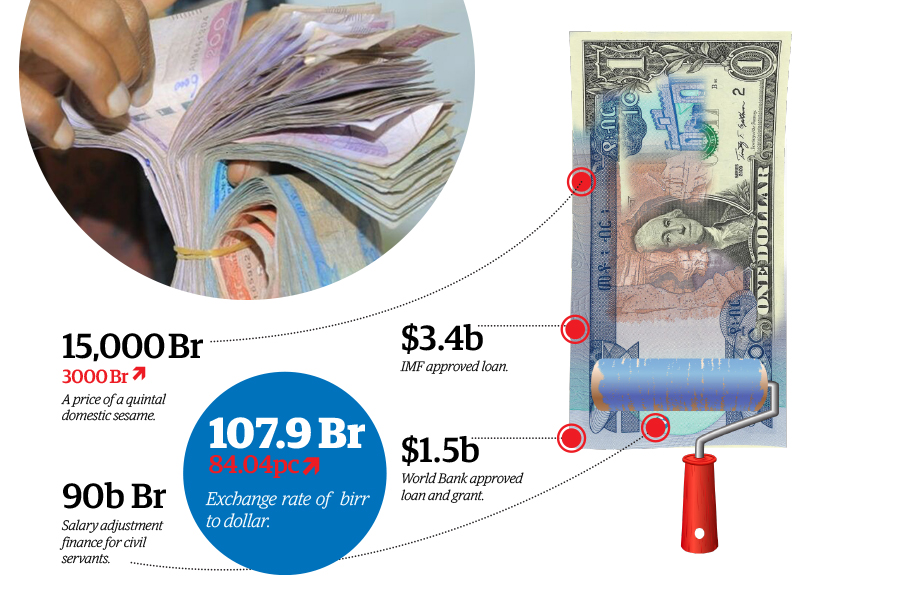
Fortune News | Jul 13,2019
Jul 31 , 2021
By Yehualashet Tamiru Tegegn
The Convention on Contracts for the International Sale of Goods, which was recently ratified by parliament, will bolster legal clarity. It is especially critical as the existing legal framework in Ethiopia is not adequate enough to be used for complex transactions, writes Yehualashet Tamiru Tegegn (yehuala5779@gmail.com), adjunct lecturer at Addis Abeba University and an associate at MTA.
In a bid to open up the economy, the government is taking various steps. One of these is Ethiopia’s ratification of the Convention on Contracts for the International Sale of Goods. The Ministry of Trade & Industry is mandated to follow up its implementation. This is a little understood and rarely brought up issue that nonetheless has several impacts upon the economy.
The Convention arises out of the existence of various disparities among legal systems, making international commercial contracts intricate and uncertain. The Convention is intended to serve as a global statutory code for sales of goods when the parties are located in different countries.
The treaty originally entered into force in 1988 after securing the minimum ratification numbers, despite initially being signed in 1980 after painstaking negotiation proceedings involving representatives from 62 countries. Since it entered into force, 95 out of 193 United Nations members have ratified the Convention. This implies that the average accession into the treaty every year is close to three. This is a high rate, given how such dealings between countries move at a snail’s pace. The accession rate is only second place to the New York Convention on the Recognition and Enforcement of Foreign Arbitral Awards, which Ethiopia also became a member state to recently.
Under the Sales of Goods Convention, Ethiopia has made a reservation regarding its applicability, restricting its binding enforcement only to states that are members. In assessing the applicability of the Convention, neither the nationality of the parties nor the civil or commercial character of the parties or of the contract is to be taken into consideration.
The critical criteria in determining the applicability of the treaty are the place of business, which is a permanent and regular place for the transaction of general business, not including a temporary place of sojourn during ad hoc negotiations. When a party has more than one place of business, the applicable place has to be closest relationship to the contract and its performance. The habitual residence, where the business is usually located, shall be referred when the party does not have an established place for reference.
The Convention applies to contracts for sales and supply of goods. But it is not applicable for contracts in connection to goods bought for personal, family or household use, sale by auction or otherwise by authority of law, negotiable instruments or money and sale of ships, vessels, hovercraft, aircraft and electricity.
A contract of sale need not be concluded in or evidenced by writing. It may be proved by any means, including witnesses. However, Ethiopia made a reservation in the ratification proclamation that a contract made other than in writing shall be of no effect.
Under the Convention, the seller has three main obligations: deliver the goods, hand over any documents relating to goods and transfer the property in the goods. If the seller fails to perform any of his obligations under the contract or this Convention, the buyer may require specific performance (relief or forced performance), substituted performance, compensation for damage, cancellation of the contract (avoidance of contract) and re-institution to their original position and interest.
The buyer also has a corollary obligation for payment of the price for the goods and takes delivery of the items. This obligation includes taking such steps and complying with such formalities as required under the contract or any laws and regulations to enable payment to be made.
The Convention provides an opt-out clause for the contracting parties, which they can trigger by simply agreeing between themselves that it will not apply. On top of this, the contracting parties can exclude the applicability of the Convention in two ways: by incorporating a choice-of-law clause, where the dispute arising under the contract shall be determined following the law of a particular jurisdiction, or implicitly by choice of forum.
As the existing legal framework in Ethiopia is not adequate enough to be used for complex transactions, the ratification of the Convention will benefit the business community by reducing the transaction costs and minimising the non-trade barriers. The ratification of the Convention together with the accession to the New York Convention on Arbitral Awards, the revision of the Commercial Code and the enactment of the new arbitration proclamation, will boost the confidence of foreign investors. It will also bolster legal certainty and will impact the domestic market which seek opportunities outside Ethiopia.
PUBLISHED ON
Jul 31,2021 [ VOL
22 , NO
1109]


Fortune News | Jul 13,2019

Commentaries | Sep 10,2021

Viewpoints | Oct 05,2024

Radar | Sep 01,2024

Fortune News | Jan 21,2023

Viewpoints | Apr 06,2024

Viewpoints | Nov 27,2018

My Opinion | May 09,2020

Fortune News | Aug 04,2024

Featured | Aug 24,2019

My Opinion | 131983 Views | Aug 14,2021

My Opinion | 128371 Views | Aug 21,2021

My Opinion | 126309 Views | Sep 10,2021

My Opinion | 123927 Views | Aug 07,2021

Dec 22 , 2024 . By TIZITA SHEWAFERAW
Charged with transforming colossal state-owned enterprises into modern and competitiv...

Aug 18 , 2024 . By AKSAH ITALO
Although predictable Yonas Zerihun's job in the ride-hailing service is not immune to...

Jul 28 , 2024 . By TIZITA SHEWAFERAW
Unhabitual, perhaps too many, Samuel Gebreyohannes, 38, used to occasionally enjoy a couple of beers at breakfast. However, he recently swit...

Jul 13 , 2024 . By AKSAH ITALO
Investors who rely on tractors, trucks, and field vehicles for commuting, transporting commodities, and f...

Jul 5 , 2025
Six years ago, Ethiopia was the darling of international liberal commentators. A year...

Jun 28 , 2025
Meseret Damtie, the assertive auditor general, has never been shy about naming names...

Jun 21 , 2025
A well-worn adage says, “Budget is not destiny, but it is direction.” Examining t...

Jun 14 , 2025
Yet again, the Horn of Africa is bracing for trouble. A region already frayed by wars...

Jul 6 , 2025 . By BEZAWIT HULUAGER
The federal legislature gave Prime Minister Abiy Ahmed (PhD) what he wanted: a 1.9 tr...

Jul 6 , 2025 . By YITBAREK GETACHEW
In a city rising skyward at breakneck speed, a reckoning has arrived. Authorities in...

Jul 6 , 2025 . By NAHOM AYELE
A landmark directive from the Ministry of Finance signals a paradigm shift in the cou...

Jul 6 , 2025 . By NAHOM AYELE
Awash Bank has announced plans to establish a dedicated investment banking subsidiary...